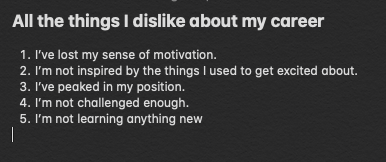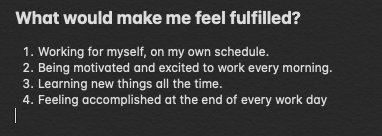Whatever you do, don’t call it a midlife crisis! And don’t let your friends convince you that it is.
A midlife career change isn’t about buying a new Corvette and being the creepy old person hanging out at singles’ bars. That’s not what we’re talking about here.
A midlife career change means personal and professional growth. It says something profound about your personality: You’re driven and intelligent, and are no longer satisfied with going through the motions at your current job.
You’re maturing as a human being.
It means that you’re a natural learner, and you’re currently dissatisfied with the amount (or complete lack of) new learning in your career.
In short, you’re feeling uninspired, which is a damned good reason to consider a midlife career change.
What is a Midlife Career Change?
The expression “midlife” can be interpreted wildly differently from person-to-person. For some, it can mean thirty years old, while for others it can mean 60 years old.
I think it has less to do with age and more to do with your professional experience within a specific niche.
Let me explain, this will make sense.
For the sake of this article, I’ll say you qualify for “midlife career change” if you satisfy the any of the following three conditions:
- You’ve peaked in your professional position; there’s little left to learn and limited room for growth.
- You feel stagnant, or “burned out.”
- You’ve lost complete interest in your area of specialization.
If any of the three bullets above resonate with you, I’m sorry. It’s a horrible feeling. It’s like trying to tread in quicksand while you watch your life waste away.
You’ve probably forgotten all about those moments of excitement and passion for learning new things. I’ve been there, and I promise there is a way out.
This article isn’t going to be total doom and gloom.
But… first, we need to talk about what a “Career change” actually means.
Does it mean doing the same thing at a different organization?
Does it mean starting completely over and learning an entirely new skill set?
Does it mean wandering the earth until you feel inspired?
Maybe, to each. Let’s break it down.
Types of Career Changes
There is a big difference between changing careers and changing companies.
If you use your exact same skill set at a new company, you’re really not changing careers. As a matter of fact, you’re probably just exchanging scenery, coworkers, and rearranging problems to solve. This can certainly be a positive move for people currently working in toxic work environments. But that’s not what we’re talking about today. We’re talking about people who have peaked, stagnated, and lost interest.
In their case, switching companies amounts to nothing more than delaying, or even distracting themselves from their burnout for a limited period of time.
So what types of changes qualify as a “Career change”?
- Using your skills as an entrepreneur: You previously use your skills to improve someone else’s bottom line. An alternative option is using your skillset for yourself, or with partners on your own venture. This is the easiest career change as it doesn’t require you to learn completely new skills, though it is likely the most risky.
- Changing your skills: The most drastic, and scariest change people can undergo is a complete redirection of their skill set. This means dropping your career path and doing a complete 180 in a new direction. The upshot is that you’ll be likely working for a company, which means you will have guaranteed consistent income.
If either of these “second career” options sound terrifying to you, you’re not alone. Changing careers can easily be one of the most stressful moments in a person’s life. It should be scary. But it shouldn’t scare you off.
PRO TIPS: Changing your current career might feel impossibly scary, like being re-born. But I can tell you from experience that it’s the only way out of your current stagnation. It won’t get any better until you finally pull the trigger.
Career Change Phases
The idea of changing your career sounds terrifying because people think they have to do everything all at once, like ripping off a bandaid.
Don’t do it that way.
You’ll overwhelm yourself and probably make a bad decision. I would recommend going through the following phases of preparation so that you’re 100% comfortable and ready to make the change once the time has come. Also, you’ll be more likely to actually do it if you’re committing to small incremental changes rather than doing everything at once.
1. Make a List
I know it’s cliche, get over it. The simple fact is that by creating a list you get the thoughts out of your head and onto paper. In your brain, thoughts make noise. On paper, they can be organized.
Think of it as therapy where you can offload all of your uncomfortable feelings. I would start by making a list of all the ways your current job is unsatisfying. Do it with me.

Feels good, doesn’t it?
Now let’s make a list of the things that would make you feel fulfilled. Imagine a world where you’re doing exactly what you want to be doing. What would that feel like?

Now we’re getting into the good stuff. Anytime you’re doubting your resolve to change your career, go through that exercise to remind yourself that you used to be inspired, and challenged, and fulfilled. Remind yourself that you can have that again.
Lastly, make a list of what would happen if you decided not to make a career change. List everything you can think of, including the positives and negatives.

In the hypothetical lists above you can see that the only main driver for keeping me from making a career change is stability of income and benefits. I’ve resolved that my life would be markedly more interesting and inspiring if I made a change, but I’m scared for my financial stability.
Your list make look completely different from mine, but hopefully a few things happened:
- You acknowledged your suffering.
- You imagined what life could be like without that suffering.
- You understand what is holding you back.
Sounds like progress, no? Good, let’s go to step 2.
2. Save Some Money
You will feel better about any life change if you’ve put some money in the bank to weather the storm. This is especially true when it comes to making a career change.
Being completely blunt, if you make a career change you will be risking financial hardship. And that’s doubly true if you decide to become an entrepreneur.
An obvious way to prepare for this potential outcome is to save yourself a bit of a buffer. If everything goes completely sideways, and somehow you end up with zero income for a stretch of time, you’re going to want to be able to support yourself for at least a few months.
I would recommend saving three to six months worth of living expenses before taking the plunge.
You just want the piece of mind to know that if everything goes completely wrong (it probably won’t) that you will have enough money to eat, and have a place to sleep until you sort things out.
3. Build Your Skills
Whether you decide to work for yourself using the same skillset, or learn a brand new skillset, you’re going to feel more confident in your choice if you learn something about what you’re going to be doing.
For example: If you decide to become an entrepreneur within your same niche and have easily transferable skills, you’re going to need to learn how to network and market yourself, how to do taxes, find a financial planner, learn how to incorporate, etc.
Another example: If you decide that you want to try something completely different from what you’re currently doing, take some courses. If I suddenly wanted to become a graphic designer, I would take as many online courses as I could get my hands on.
This is all about preparation and setting your mind at ease so that when the moment comes, you’ll be ready to handle anything in your new career path.
PRO TIPS: If you’re going to be applying for a different job, make sure that you prepare a career change resume! This will build your confidence and increase the likelihood that you will land an interview.
4. Be Wary of Cold Feet
If you haven’t realized it by now, the key to a successful career change is preparation and confidence in yourself. One will build on the other. As you become increasingly prepared, your confidence in yourself will grow alongside.
If despite all your preparation you still can’t pull the trigger, remember to go back to your listing exercise and remind yourself why you were considering the change in the first place. Do you really want to continue living uninspired until you have a complete breakdown and burnout? Do you want to keep delaying the inevitable until something forces you to make a change that’s out of your control (like a breakdown)?
Stick the path. If you’ve successfully gone through the previous steps, you’re gonna be a successful career changer.
Switching Careers, Conclusion
“Changing career”… a terrifying statement, no doubt. There’s a reason why millions of people “comfortably” tolerate the same drudgery day in and day out; fear of change is more overwhelming than the familiarity of despair.
I know it sounds painfully pessimistic, but it’s 100% the truth. And you know it.
But remember, nobody is forcing you to do everything all at once. You can phase this thing out and take on little bit-sized phases of the project. Make it as easy on yourself as possible so that when the moment comes, you’re prepared for everything.
And most importantly, don’t forget that you used to feel inspired by your career. And you can be again.




